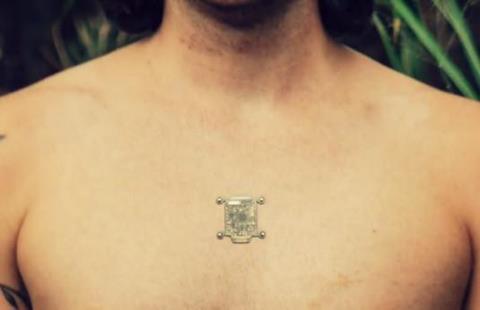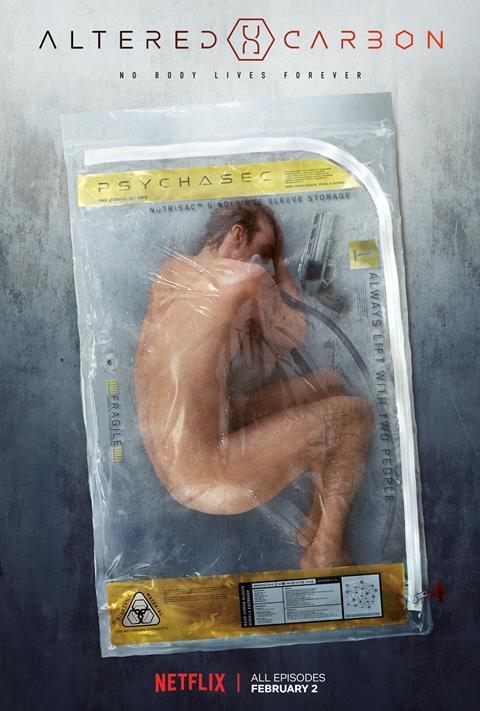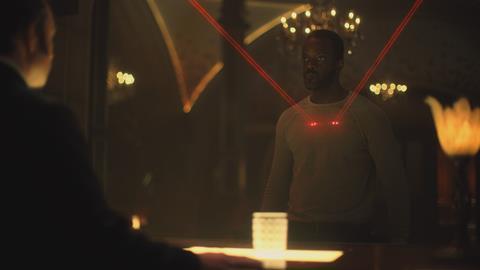Netflix’s Altered Carbon explores the subject of biohacking, but is the series science fact or science fiction?
In the new Netflix series Altered Carbon we get a glimpse of what the human experience could look like 350 years from now.

The show imagines a future where people can live forever by downloading their memories and consciousness into tiny harddrives that can be implanted over and over again into disposable bodies called ‘sleeves’.
While ‘re-sleeving’ might be science fiction for now, innovations and a growing interest in biohacking are already blurring the line between human and technology, and soon this line may not exist at all.
Living in an upgrade culture it’s only natural that people are starting to look at how they can enhance themselves through technology.
Biohacking is the act of augmenting the body with technology to create new senses, enhance abilities, and bring new dimensions to the human experience. One of the most popular bio-hacks today is implanting Radio-Frequency Identification (RFID) microchips.
It’s estimated that over 10,000 people currently have these grain-size chips fixed under the skin, commonly between the thumb and forefinger. These chips can be used as identification in place of keys and passwords to unlock doors, phones and computers, as storage devices, or to make instant purchases.
While some people look at implants and digital enhancements as a trend akin to
tattoos or piercings, there is a growing expectation that this is actually the next phase in human evolution.
At a recent Virtual Futures event in London, a diverse panel of experts shared their unique views and experiences on the topic of biohacking.
Cyborg Nest Chief Executive and Co-founder Liviu Babitz believes that there is more to the world than we can currently sense.

With the help of technology we can upgrade ourselves to create new senses enabling us to experience the world in new ways. Attached to Babitz’s chest is Cyborg Nest’s latest product North Sense, a device that vibrates every time he faces North. It allows him to understand, sense and feel another dimension, one that has been invisible up until now.
Application drives adoption, and providing compelling reasons for people to embrace bio-augmentation is key. Dangerous Things is a US company specialising in ‘custom gadgetry for the discerning biohacker’. Founder and CEO Amal Graafstra said that the people embracing augmentation today have genuine hope for the future, and noted a severe drop-off after the 2016 US election.
Besides offering RFID and NFC (Near Field Communication) implants, they also offer a range of other products, including bio-magnets.
Field sensing, or ‘magnetic vision’, can change the way environments are perceived by providing a tactile reaction to magnetic fields. These magnets can also be used to transmit sound between the finger and ear, a novel idea that originated as a way to help students cheat on tests.
Lepht Anonym is a DIY Transhumanist and biohacker with over fifty self-experiments to date.
Ethically speaking, she believes it is only right to experiment on the self because of the risk and pain involved, and while she seeks advisement from the doctors, ultimately she accepts the success or failure of experiment as her sole responsibility.
The knowledge she gains gets disseminated back into the community through forums such as Biohack.me, as this process of testing, experimenting, and invention is forming the platform for future breakthroughs and innovation.

Another area contributing to this groundwork of study is coming from the medical field, where things that we can take for granted, like cochlear implants, prosthetics, and even birth control, are in fact a form of bio-augmentation.
Matt Eagles has had Parkinson’s disease for 43 years and for the last 11 years he has relied on an electrode stimulator attachment with remote control to help him walk. For him, this device that alters the frequency to his brain is the difference between walking and not walking, and he credits it with restoring his dignity.
He also admits that this leaves him susceptible to having his brain hacked. Instead of being worried about this though, he says he’d be more worried if people weren’t trying to push boundaries and experiment and question what’s possible.
At the moment, the bio-hacking industry is self-regulating, relying on the laws of bodily autonomy for self-experimentation.
As technology improves though, so will the advantages, which could lead to a tipping point for mass adoption.
In the meantime, biohacking, cyborgs, and transhumanists are daring to push the boundaries of curiosity and in doing so, redefining what it means to be human.
It’s also a great reminder that while Altered Carbon makes for great entertainment, the reality may not be as far away as it seems. And with biohacking enabling people to sense and feel other dimensions, it could also open up possibilities for ever more immersive experiences.
Amelia Kallman is a futurist, speaker, journalist, author, nightclub owner and director of the first virtual reality burlesque show. Read more of her IBC365 articles here.

























No comments yet